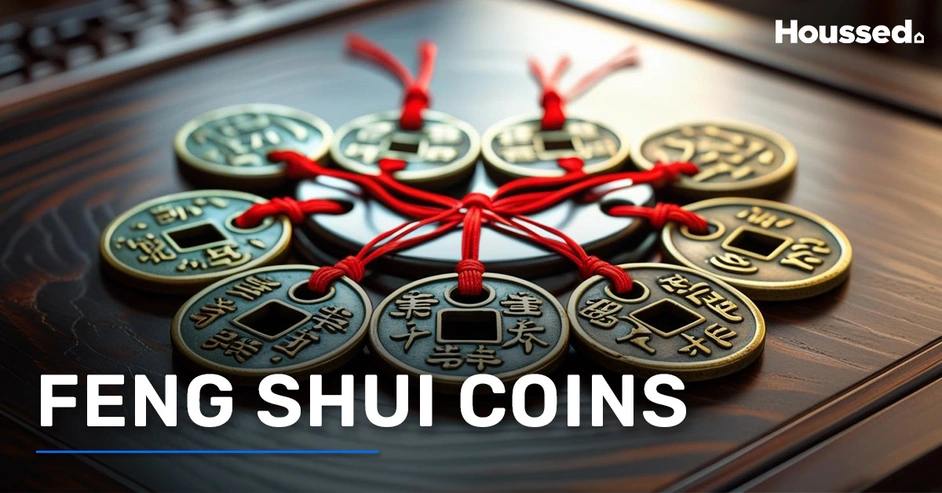Feng Shui Coins 2025 | Direction, Benefits & More

Feng Shui coins are ancient Chinese symbols believed to attract wealth, prosperity, and positive energy. In 2025, their significance continues to rise as more people turn to traditional practices to enhance harmony and attract financial success.
Whether placed in homes, offices, or personal spaces, knowing how to position these coins correctly is key to unlocking their full potential.
This comprehensive guide offers practical insights and expert tips on utilizing Feng Shui coins in 2025 to effectively activate and amplify wealth energy.
What Are Feng Shui Coins?
Definition and Significance
Feng Shui coins are ancient Chinese coins, usually round with a square hole in the middle, representing the balance and unity between the heavens (circle) and the earth (square).
These coins are powerful symbols that attract wealth, prosperity, and positive energy. They are often tied together with red strings and placed in specific areas to enhance the auspicious energy flow.
Historical Background
The use of Feng Shui coins dates back to ancient China, where they were not only used as currency but also to protect against negative energies and bring prosperity.
During Chinese New Year celebrations, they became popular gifts and were frequently used in Feng Shui practices to attract wealth, health, and protection.
Also Read - 7 Horses Painting Vastu
Types of Feng Shui Coins
1: Three Emperor Coins
The three emperor coins set, featuring Qianlong Tongbao, Jiaqing Tongbao, and Daoguang Tongbao, is popular for its sound of "money gets home," indicating prosperity and avoiding evil.
It represents the trinity of heaven, earth, and mankind, promoting harmony and attracting wealth. These coins are commonly tied with red strings and placed in wallets, purses, or cash registers to enhance financial luck.
2: Five Emperor Coins
Five emperor coins, also known as "Wu Mei," are copper coins minted during the reigns of five Qing Dynasty emperors.
It brings blessings and positive transformations while also dispelling evil and negative energy. People can improve their luck and attract good fortune by selecting the right place based on their personal birthdate and feng shui principles.
3: Ten Emperor Coins
Ten emperor coins, copper-alloy cash coins from the reigns of ten emperors, are utilised in feng shui to protect against evil spirits and promote prosperity, wealth, and auspicious luck.
These coins are typically used in larger spaces or businesses to maximise their beneficial effects.
4: Coin Swords
Coin swords are crafted by stringing together multiple Feng Shui coins as a sword. They are used to ward off evil spirits and negative energies.
Typically hung above doors or in offices, coin swords serve as protective talismans and attract prosperity.
Benefits of Feng Shui Coins
- Attract Wealth and Prosperity: Feng Shui coins are believed to attract financial abundance and opportunities.
- Enhance Positive Energy (Chi): It helps to balance and promote the flow of good energy in an area.
- Provide Protection: Coins, especially when arranged in specific configurations, are thought to ward off negative energies and protect against misfortune.
- Promote Harmony: By symbolising the union of heaven and earth, it fosters harmony in both personal and professional relationships.
- Boost Career Success: Placing coins in workspaces can enhance productivity and open up career advancement opportunities.
Also Read - Elephant Statue at Home as per Vastu
Right Placement of Feng Shui Coins
Home
- Main Entrance: Place three or six coins tied with a red ribbon inside the main door to attract wealth into the home.
- Wealth Corner: Identify the southeast corner of your home (the wealth area) and place coins there to enhance financial prosperity.
- Living Room: Display coins in a prominent location, such as a coffee table or shelf, to attract abundance and encourage positive energy flow.
Office
- Desk Area: Keep a set of Feng Shui coins on your desk or drawer to enhance productivity and attract financial success.
- Cash Registers or Lockers: Place coins near cash registers or safes to boost business cash flow.
- Wealth Corner: Identify the far left corner of your office as the wealth area and position coins there to invite professional growth and success.
Personal Use
- Wallet or Purse: Place three Feng Shui coins in your wallet or purse tied with a red string to invite personal wealth and financial luck.
- Keychains or Bags: Attach coins to keychains or bags as a constant reminder of your financial goals and to attract prosperity wherever you go.
Best Direction to Place Feng Shui Coins
Based on the Bagua Map
In Feng Shui, the Bagua map is used to determine the energy centres of a space. The southeast corner is associated with wealth and abundance.
Placing Feng Shui coins in this area can activate financial prosperity. Ensure the coins are clean and tied with a red string to enhance their effectiveness.
The table below highlights the areas of life, ideal home locations, and elements:
|
Ground |
Location |
Element |
|
Wealth |
Southeast or rear left corner of the house |
Wood |
|
Reputation |
South or rear middle section of the house |
Fire |
|
Love and Relationships |
Southwest or rear right corner of the home |
Earth and Fire |
|
Family and Community |
East or left middle section of the house |
Wood |
|
Health and Wellness |
Centre of the home |
Earth |
|
Creativity and Children |
West or right middle section of the house |
Metal |
|
Knowledge and Wisdom |
Northeast or bottom left corner of the home |
Earth and Water |
|
Career and Life Path |
North or bottom area of the house |
Water |
|
Helpful People and Travel |
Northwest or the bottom right corner of the home |
Metal |
Also Read - Crystal Tortoise Face Direction in Home
Feng Shui Coins - Do’s and Don’ts
|
Do’s |
Don’ts |
|
Always tie coins with a red string |
Do not place coins in cluttered or dirty areas |
|
Wipe the coins regularly with a dry cloth |
Avoid using damaged or tarnished coins |
|
Position coins in areas associated with wealth and prosperity (in the southeast corner) |
Avoid using too many coins |
|
Place them near cash registers, lockers, account books, or even inside your wallet |
Avoid placing coins on the Floor or in the Bathroom |
Summary
What Are Feng Shui Coins?
Feng Shui coins are traditional Chinese symbols with a round shape and square hole, representing harmony between heaven and earth.
Types of Feng Shui Coins
- Three Emperor Coins
- Five Emperor Coins
- Ten Emperor Coins
- Coin Swords
Benefits of Feng Shui Coins
- Attract Wealth and Prosperity
- Enhance Positive Energy (Chi)
- Provide Protection
- Promote Harmony
- Boost Career Success
Right Placement of Feng Shui Coins
- For home: Main entrance, wealth corner, living room
- For office: Desk area, cash registers or lockers, wealth corner
- For personal use: Wallet or purse, keychains or bags
Best Direction to Place Feng Shui Coins
The southeast corner of your home is the ideal direction to place Feng Shui coins. It is associated with wealth and can enhance financial prosperity. Use a red string to strengthen their power.
Feng Shui Coins - Do's and Don'ts
- Do's:
- Tie Feng Shui coins with a red string
- Keep them clean
- Place them in wealth zones–southeast corner.
- Don'ts:
- Avoid cluttered areas
- Avoid placing it on the floor or in bathrooms
- Don’t use damaged or tarnished coins.
FAQ's
Feng Shui coins symbolise the union of heaven and earth, attracting positive energy and financial prosperity when placed strategically in homes or offices.
To ensure good luck, it is recommended to use sets of three, five, or six feng shui coins tied with a red string, each with specific meanings related to wealth and protection.
Feng shui coins should be placed near the main entrance, the southeast wealth corner, or on financial documents to attract wealth.
Feng Shui coins should face upward, symbolising the flow of wealth into the home or office.
To activate Feng Shui coins, tie three coins with a red string and place them in the southeast corner of your home or office. Keep them clean and ensure the coin faces upward to attract prosperity.
Yes, placing coins near cash registers, lockers, or office desks can boost business prosperity and attract customers.
Absolutely! Gifting Feng Shui coins is considered auspicious and is believed to bring good luck and prosperity to the recipient.
Thread the red string through the square holes of the coins, ensuring they lie flat and are tied securely, symbolising unity and strength.
Feng Shui coins remain effective as long as they are kept clean, tied with a red string, and placed in the correct location. However, replace the coins periodically to maintain their positive energy.
Yes. Feng Shui coins are suitable for everyone, as they symbolise wealth, good luck, and prosperity.









